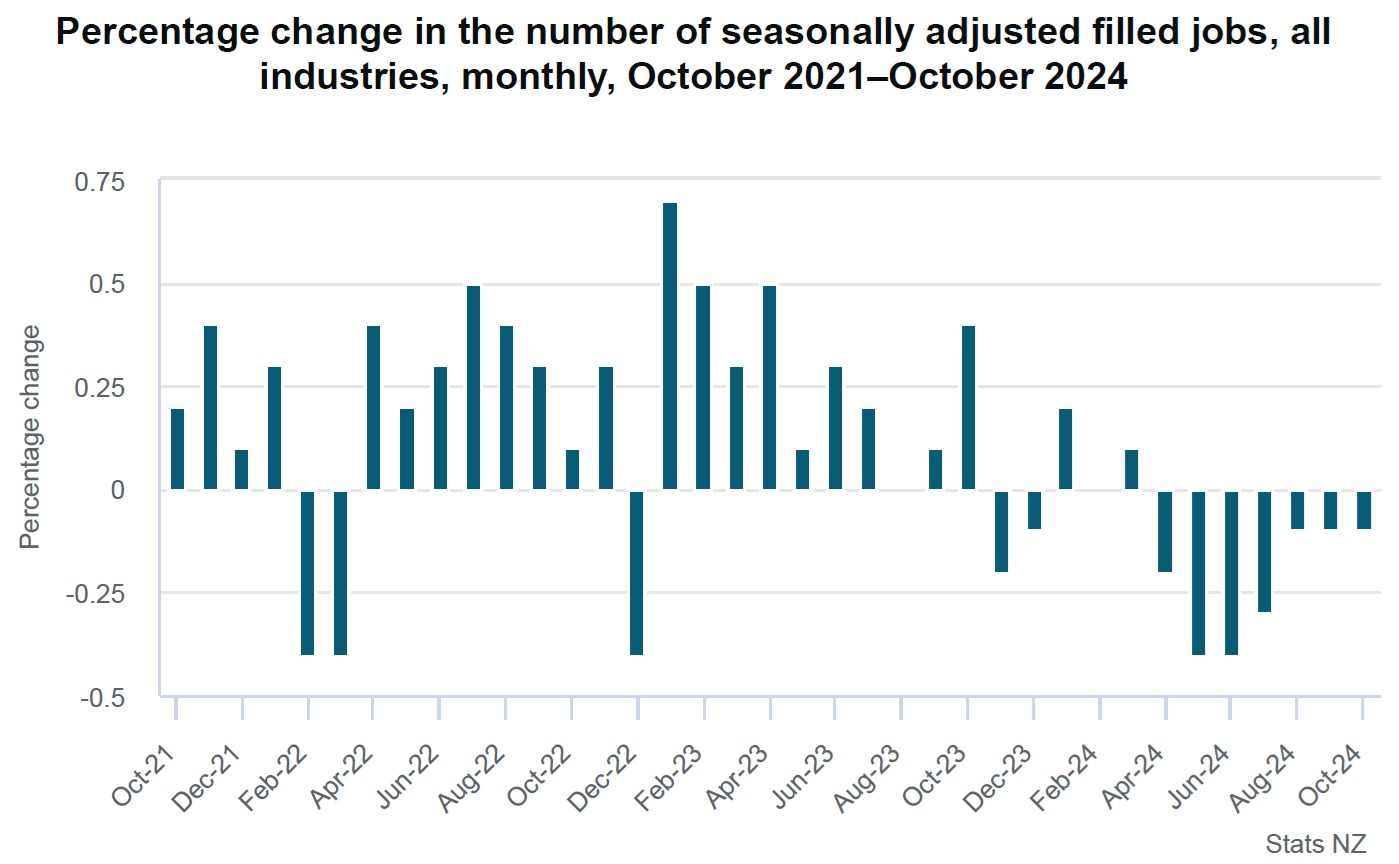
The number of filled jobs in New Zealand has fallen for the seventh consecutive month, according to the latest monthly figures from Statistics NZ.
And according to Stats NZ's Monthly Employment Indicators (MEI) there are over 35,500 fewer jobs now in NZ than there were a year ago. The younger age groupings continued to see the biggest proportion of falls, with over 30,000 jobs gone in the 15-29 age bracket.
The figures for October 2024 show that, on a seasonally-adjusted basis, the number of filled jobs fell by over 2,000 (0.1%) to 2.36 million, following a revised down drop of 0.1% in September.
It means that in the past seven months the filled jobs numbers have consecutively fallen by between 0.1% to 0.4%. (Note that the month-on-month comparisons are seasonally-adjusted while the year-on-year comparisons use actual figures.)

These numbers are prone to extensive revision - but the recent pattern has been that they've tended to be revised down in subsequent months.
The MEI figures come from Inland Revenue data and are therefore sourced quite differently to the quarterly unemployment figures that come from Stats NZ's Household Labour Force Survey.
According to the latest HLFS figures for the September quarter, released in early November, NZ's unemployment rate has risen to 4.8% from 4.6% as of the June quarter.
The Reserve Bank (RBNZ) is forecasting that the unemployment figures will continue to rise, peaking at 5.2% in the March quarter 2025.
Stats NZ's MEI seasonally adjusted figures for October show that the key changes in the month were:
- all industries – down 0.1% (2,017 jobs) to 2.36 million filled jobs
- primary industries – up 1.2% (1,304 jobs)
- goods-producing industries – down 0.2% (1,006 jobs)
- service industries – down 0.1% (2,557 jobs).
The non-seasonally adjusted (IE, actual) figures showing the picture for the past year show that by industry, the largest changes in the number of filled jobs compared with October 2023 were in:
- public administration and safety – down 7.2% (12,671 jobs)
- construction – down 5.3% (11,141 jobs)
- health care and social assistance – up 3.7% (10,059 jobs)
- administrative and support services – down 6.2% (6,362 jobs)
- accommodation and food services – down 3.5% (5,615 jobs).
By region, the largest changes in the number of filled jobs compared with October 2023 were in:
- Auckland – down 1.9% (15,756 jobs)
- Wellington – down 2.2% (5,706 jobs)
- Waikato – down 0.8% (1,869 jobs)
- Manawatū-Whanganui – down 1.5% (1,732 jobs)
- Canterbury – down 0.5% (1,708 jobs).
By age group, the largest changes in the number of filled jobs compared with October 2023 were in:
- 15–19 years – down 12.3% (16,988 jobs)
- 25–29 years – down 5.0% (13,386 jobs)
- 35–39 years – up 3.2% (8,609 jobs)
- 20–24 years – down 3.5% (7,950 jobs)
- 40–44 years – up 2.2% (5,387 jobs).
26 Comments
If what is happening around me is representative then those numbers will continue to be negative for sometime to come
If what's happening around me is representative then those number are inaccurate and we are in a booming economy.
You schmooze with the elite?
Yeah nah.
real gdp per capita is falling
The fact that the powers that be optomise for GDP rather than GDP/person is an admission that the the country is really controlled the wealthy who are gleefully motivated to feed people into the economy rather than the economy being setup to feeding people. And any people will do, locals be damned there is an endless tap of billions from India and China willing to accept a worse deal on jobs and houses.
Good comment. A concerning stat on this trend is that despite real GDP per capita showing some growth between 2013 and 2023, real GDP per person employed remained somewhat stagnant during this period (Link).
We're clearly doing worse than many of our global peers in this regard, thanks to very high net influx of working-age migrants largely going into low-skilled work.
And that's without mentioning what a terrible metric GDP is in the first place, where the many billions of dollars of profits made by the big banks and international corporations in New Zealand all count as GDP, but almost all of those monies are siphoned off overseas.
you selling green shoots?
If what is happening around me is representative then those numbers will continue to be negative for sometime to come
Last week at least 4 major engineering/construction/planning companies I know people in initiated another round of redundancies. It's relentless.
This stat does not only capture job losses, which are painful in the short term, but also roles left behind by skilled Kiwis leaving the country that employers are unable to fill, which could constrain economic recovery.
We're seeing this two-speed trend in my broader sector where civil construction (housing, commercial, industrial, transport) is dead in the water but there are thousands of unfilled job openings in certain domains (power gen, transmission, distribution, electrical instrumentation, control systems, etc.).
Interesting, thanks. This is what concerns me about the govt's plans to go for infrastructure and growth... We're losing some of the capacity we need, and lots of projects will be hard to get off the ground due to other skills shortages.
We're seeing this two-speed trend in my broader sector where civil construction (housing, commercial, industrial, transport) is dead in the water but there are thousands of unfilled job openings in certain domains (power gen, transmission, distribution, electrical instrumentation, control systems, etc.).
Yep, we must be in the same sector as that's exactly what I'm seeing. Not only that but I'm also seeing young 2-7 years experience head overseas even if they aren't affected as their mates who are affected have gone abroad and told them how much better it is. Ozzie, US, Canada and Europe mainly. Seeing a few middle-eastern based people coming back to NZ but they seem unimpressed with the wages vs cost of living.
Awesome to be "back on track", ay?
Let's assume a 65k median for those 35500 jobs. That's 426 million in PAYE and ACC levies not coming in from mostly younger people who don't take too much out the other end in terms of government spending. Not to mention the GST collected from their spending. No wonder the Treasury are frantically trying to re-forecast revenues. But never mind we can replace them with immigrants who are willing to live in shipping containers while they try to scratch out enough money to send remittances back to their families and pay off the loan sharks and visa scammers that got them here in the first place.
Harsh but honest assessment Westie
Add to this the ever growing super annuitant dependency that grows year on year.
RBNZ: House prices up, herpa derp.
National, the party of business.
Labour, the party of monumental hangovers.
Are yes that old chestnut...let me guess you will be muttering next Xmas?
Does National know its Xmas time at all???
Can someone explain to me the seasonal adjustment when it's measuring the same month year on year?
What adjustments are they making that take the number from down 35,500 to down only 2,000?
What were those 33,500 jobs that existed last October that were considered seasonal and not repeating this year for the same month?
The 33,500 is the annual fall, the 2,000 is the monthly.
What commentators have failed to pickup (because they lack my geekiness) is that last October's figures were temporarily boosted by the 10,000 jobs working on the election. So, factoring that in, the annual drop is more like 23,000.
That doesn't sound right. Here's some data for you, geek.
You are saying 10k jobs have been lost because of people working on elections last October, which I am certain would be classed under public admin and safety. That leaves 2,671 job losses in the sector as per the stats (12,671 job losses since Oct 2023 reported in public admin and safety).
Meanwhile, the sector has reported 9,520 job cuts, which I understand a proportion will be unfilled job openings, but majority are actual workers made redundant.
Lol, 'here's some data from official stats that I am going to mash together with some numbers from press releases to prove, errrm, something, geek'!
Here's the public admin jobs data. See if you can spot the two election months!
Now, remember that the overall public sector is still recruiting while some departments downsize. Voila, plateau.
The silence from the big banks is deafening.
We are in the Bay of Plenty, one of the highest youth unemployment rates in the country. Number one son and his partner both with engineering degrees are doing well. Second son (22) graduated with Bachelor of Computer Science 12 months ago has struggled to find work. Got a job as a test engineer for 4 months at slightly more than minimum wage. They liked his work but they wouldn't offer him a permanent position. He has come home and now on Jobseeker support. Number 3 son (22) has been doing trade training (automotive) for the last two years, hasn't been able to secure an apprenticeship. Course has finished and he has applied for Jobseeker support. Number four son (21) started building industry training a year ago but currently no job prospects locally. He will go on Jobseeker support now the course is finished. The local training facility is planning to scrap the course next year. I don't see things improving in the near future so we are considering our options which includes a move overseas to give my kids a better chance.

We welcome your comments below. If you are not already registered, please register to comment
Remember we welcome robust, respectful and insightful debate. We don't welcome abusive or defamatory comments and will de-register those repeatedly making such comments. Our current comment policy is here.